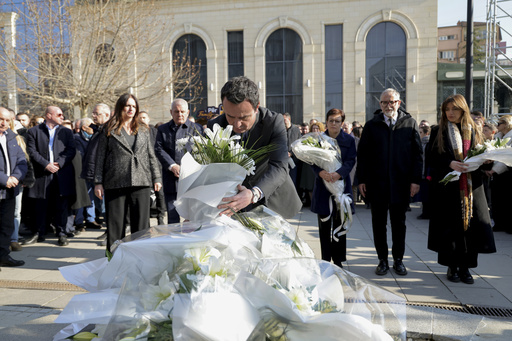PRISTINA, Kosovo — In the recent parliamentary elections, Kosovo Prime Minister Albin Kurti’s left-leaning Self-Determination Movement Party, known as Vetevendosje!, achieved the highest number of seats. However, the party fell short of an outright majority, prompting a search for potential allies to establish the next government. These preliminary election results were shared on Monday, highlighting the significant implications for Kosovo’s leadership amid stalled negotiations with Serbia and uncertain foreign investment for this economically challenged region.
This election was particularly noteworthy as it marked the first full four-year parliamentary term for Kosovo since it declared independence in 2008. It was also the ninth parliamentary election since the conclusion of the 1998-1999 conflict in which NATO intervened to help oust Serbian forces from Kosovo. It remains important to note that Serbia does not acknowledge Kosovo’s independence.
With 98% of the votes tallied, Vetevendosje! secured approximately 40.94% of the popular vote, according to the Central Election Commission. The Democratic Party of Kosovo (PDK) followed with 22.11%, while the Democratic League of Kosovo (LDK), the nation’s oldest political party, garnered 17.67%. The Alliance for Kosovo’s Future, led by former Prime Minister Ramush Haradinaj, received 7.44%. Although Kurti celebrated his party’s success, he did not disclose any potential coalition partners at this stage.
“The people’s voice has been heard. Vetevendosje! is set to lead the next government,” Kurti stated, as his supporters took to the streets in jubilation. The Central Election Commission experienced website issues due to high traffic from citizens eager to learn the outcome, and results were compiled manually. Early reports indicated a voter turnout of 40.6%, which reflects a decrease of around 7% compared to the previous parliamentary elections.
The newly constituted parliament comprises 120 seats, ten of which are designated for the Serb minority, and an additional 10 seats allocated for other minorities, regardless of overall election results. As Kurti begins his new term, a host of challenges await him, particularly as international aid from both the U.S. and the European Union has been constrained over the last two years. Prominent issues include the need for increased public sector wages, enhancements to education and healthcare services, and tackling poverty.
Despite its small population of 1.6 million, Kosovo faces significant economic challenges, with an annual GDP per capita under 6,000 euros ($6,200). Kurti is also expected to work towards mending relationships with Western nations that have been strained due to his government’s recent tensions with Serbia and the ethnic Serb community. Notable actions that heightened tensions include the prohibition of Serbian currency, the dinar, as well as restrictions on monetary transfers for Serbs in Kosovo.
The ethnic Serb population in Kosovo heavily relies on social services and financial support from the Serbian government. Given these sensitivities, the U.S., EU, and the NATO-led KFOR force have cautioned the Pristina government to avoid unilateral actions that could reignite ethnic discord. EU Ambassador to Kosovo, Aivo Orav, expressed hopes for a smooth formation of the new Cabinet, stressing the importance of meeting public expectations, especially regarding Kosovo’s aspirations for EU membership.
“Citizens see the European Union as a pathway for human rights, law adherence, and enhanced living standards. The new government will need to engage vigorously to achieve these goals, with necessary reforms firmly in place,” he added.
In the same election cycle, Srpska Lista, the main political entity representing the ethnic Serb minority, received 4.33% of the votes, slightly down from its previous performance. Party leader Zlatan Elek expressed gratitude to Serbian President Aleksandar Vucic for continued support for their community. Political analyst Dusan Radakovic noted that the Serbian community still holds faith in Belgrade and trusts that Srpska Lista will effectively advocate for their concerns in future negotiations for resolution.
Amidst these developments, KFOR has maintained an increased presence in Kosovo, particularly following tensions with Serbia and in the lead-up to this election. In total, over 1,600 monitors from various international and local organizations closely observed the voting process, contributing to the overall transparency of the electoral experience.



